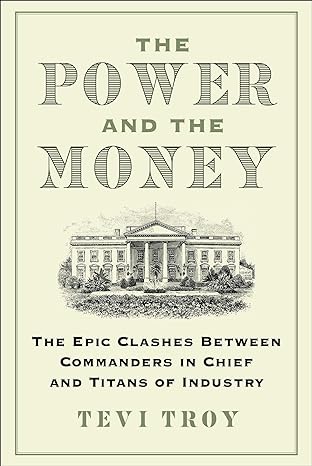What We’re Reading: ‘The Power and the Money’

With an election looming in November, CEOs and their reports are spending a lot of time contemplating what changes are on the horizon. Enter presidential historian Tevi Troy with his new book “The Power and the Money: The Epic Clashes Between Commanders in Chief and Titans of Industry.”
“Although the universe of CEOs who deal with presidents is enormous, the number of CEOs with consequential interactions with more than one president is more finite,” writes Troy in his forward. His book looks at 18 CEOs who navigated American politics during key periods, including Rupert Murdoch, Katharine Graham, Henry Ford, Oprah Winfrey, Bill Gates, the Warner Brothers and Mark Zuckerberg.
“For current and future CEOs, this book can be a guide for how to engage with an increasingly powerful and involved federal government, especially in our era in which both Democrats and Republicans target corporations in the rhetoric and often in the policy prescriptions,” Troy writes. “For the rest of us, this is a cautionary tale of what happens when the federal government gets too big and too enmeshed in the activities of the producers and innovators in our economy: our costs go up while our freedom diminishes.”
Troy, currently a senior fellow at the Bipartisan Policy Center, recently appeared on C-SPAN’s “Booknotes+” podcast with Brian Lamb. The C-SPAN founder got him to open up about one of his favorite CEOs to research for the book—legendary movie mogul Lew Wasserman. He wanted to buy a studio, which was against the rules at the time. “And Wasserman, who had studiously ignored government his whole career, suddenly said, ‘I have to pay attention to government.’ And he got really good at it,” he explained, detailing how Wasserman cultivated relationships with Lyndon Johnson, Ronald Reagan and Bill Clinton.
Troy’s own history is interesting. He worked for several notable Hill figures, including Sen. John Ashcroft and Elaine Chao, who was Secretary of Labor under George W. Bush and Secretary of Transportation under Donald Trump. “She used to tell me really interesting things about corporations. She’d say, ‘we think that corporations are on our side as Republicans, but you don’t necessarily want to be in a foxhole with them, because they’re kind of constant allies,’” he recalled to Lamb. “They go where the power is,” meaning whichever party is in charge.
With headlines abounding about Elon Musk’s donations to a pro-Trump Super PAC and Kamala Harris reportedly making a pitch to CEOs that she’d be good for business, the book and podcast are timely undertakings. In Troy’s view, corporations are in some ways actors on behalf of the government given the large role it plays in shaping what they do. He might need to write a follow-up in 2025. – Amy Maclean